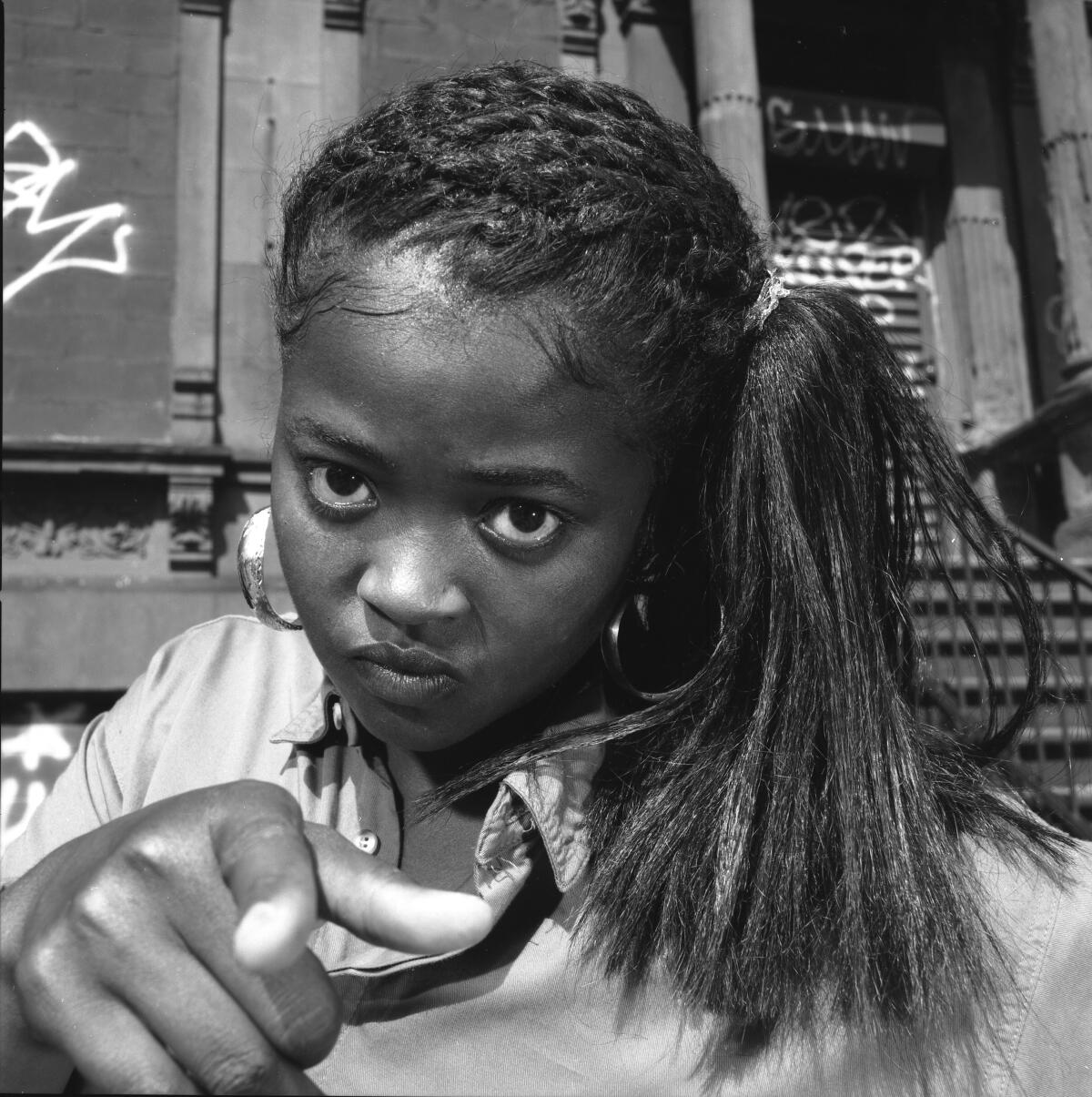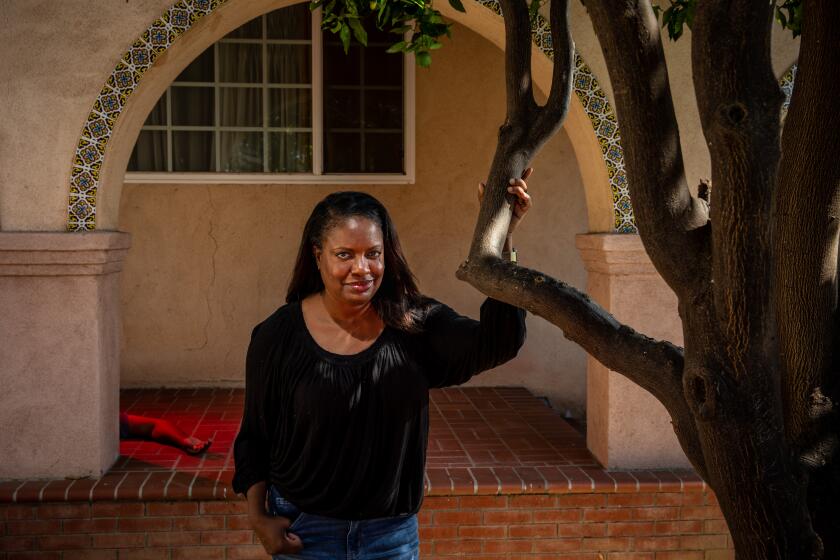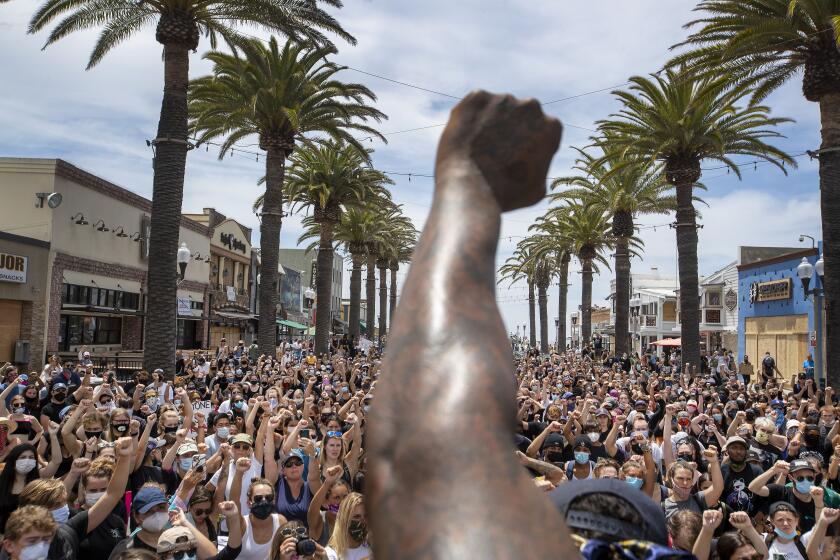Why it took Sister Souljah 22 years to write a followup to her groundbreaking novel
On the Shelf
Life After Death
By Sister Souljah
Atria: 352 pages, $27
If you buy books linked on our site, The Times may earn a commission from Bookshop.org, whose fees support independent bookstores.
In 1999, Sister Souljah published her first novel, âThe Coldest Winter Ever,â considered to be the mother of whatâs been called urban or street fiction and its first classic.
Its heroine, Winter Santiaga, the pampered daughter of a Brooklyn drug kingpin, uses her feminine wiles and hustler mentality to survive after her fatherâs empire suddenly comes crashing down. âThe Coldest Winter Everâ was one of the best-selling novels of 1999 and has since sold more than a million copies. Needless to say, the publisher wanted more.
âQuite naturally, the book company and everyone [else] expected me to write the sequel,â said Souljah by phone from the United Arab Emirates, where she had gone to find âpeace of mindâ and to finish a draft of the bookâs long-awaited screen adaptation.
But because Winter Santiagaâs story had ended with a mandatory 15-year prison sentence, Souljah felt she had to wait until Winterâs time was served. âI didnât want to feed the hood a fantasy that going to prison is a joke or a cakewalk,â she said. âLike âTa-da! Here she is,â and itâs all good. There are real consequences to the things that happen in real life.â
So instead she wrote spinoffs: three books about Midnight, the handsome and capable lieutenant of Winterâs father, Ricky Santiaga, and one about Winterâs younger sister Porsche, who ends up in juvenile detention. She even planned to write a Ricky story (and still hopes to). âBut the character was always alive in my imagination,â Souljah said. Finally, 22 years later, Winter is back in âLife After Death,â out this week.
True to Souljahâs insistence on consequences, the sequel begins with a hard shock: Winter is dead, stuck in a purgatory known as the Last Stop Before the Drop, and given one last chance to avoid eternal damnation. âPeople have said, âItâs so unexpected,ââ said Souljah. âAnd I say, as an author, if I write what any reader expects me to write then Iâve failed because that means the readers could have written the book. I want to write something that you never would have imagined.â
Rachel Howzell Hallâs new novel, âAnd Now Sheâs Gone,â breaks the crime-fiction mold; its success proves a long line of publishers wrong.
Though Winterâs journey in âLife After Deathâ may take place largely in the metaphysical realm, thereâs still plenty of sex, danger and debauchery. âI didnât want to write a book where everything looks the same as how people expect or imagine,â said Souljah. âGrowing up Christian, thereâs the devil and he has horns and a tail ... It doesnât resonate with what you can see with your eyes in the real world.â
Preparing to invent her own underworld, Souljah researched religious texts for seven months, â[mainly] nonfiction works that refer back to the major three books: The Torah, The New Testament and the Quâran.â
She also read Danteâs âInferno,â which she didnât like. âI thought it alienated the reader, the way that it was written,â she said. âI never want to write books like that. I want you to read [my] books and be blown away because it was so close to your own soul and experience and you can take things from it and use it in your own real life.â
Souljahâs outspokenness made her a flashpoint of national politics long before she wrote her bestselling novel. For a time, she was a member of the anti-racist rap group Public Enemy, and in the wake of the 1992 L.A. riots she said publicly, âIf Black people kill Black people every day, why not have a week and kill white people?â Then-Presidential candidate Bill Clinton denounced her. (She responded that her quote had been taken out of context.)
Ever since, any political denunciation of radical ideas (like Barack Obamaâs over Jeremiah Wright) has been glossed as âa Sister Souljah moment.â Asked how she feels about the term today, she said, âA Sister Souljah moment is simply âa moment of truth.â And the truth should never ever be considered radical or un-American.â
Walter Mosley, Luis Rodriguez, the coiner of #BlackLivesMatter and others sketch a hopeful future for L.A. and the U.S. after George Floyd protests.
Souljahâs books counter the caricature of her as an advocate of violence. Having grown up (as Lisa Williamson) in the South Bronx during the drug-ravaged â70s and â80s, she says she wrote âThe Coldest Winter Everâ as a cautionary tale. âIt was my desire to show our people that this lifestyle that we glorify is actually a death-style,â she said. âAnd it doesnât end nicely, almost ever.â
As a child, she lived in fear of the heroin epidemic. âIt was explained to me and my brothers and sisters as a life-or-death situation,â she said. âPeople carried around needles in their pockets. I was horrified about people drugging me or anyone in my family. I would say my prayers before bed and ask for protection.â
Soon she began to notice the glamour of the drug-dealer lifestyle. âWhen you hit the teen years, I think thatâs when you notice the flash. So I wanted to write a story about drugs without writing something that preaches to people because I didnât think that preaching was something that people would accept, listen to or learn from,â she said.
Sheâd thought about writing from the perspective of a dealer before trying something closer to her experience: âI do know about girls and women and love.â

Though Souljah is often credited with igniting the urban/street genre, she considers the category inherently racist. âWhen a Black author writes, itâs not literature,â she said. âI mean, who are these âstreetâ people anyway? What are people who are not street authors writing about? The topics are the same. âRomeo and Julietâ is a battle between families that are basically in gangs, so why donât they call Shakespeare street literature?â
She finds the idea of a lower class of writing insulting. âIf you look at my characters and my storytelling, it spans from the inner city to the suburbs to several countries outside of America. Youâll see Japan, Korea, China, the UAE and Oman mentioned. And before writing about these places, I normally travel there and stay long enough to get a sense of the people, the culture, the language. So why belittle all of that effort by then saying âNo, this is only urban literature. Only a certain set of people will buy it and understand it and thatâs why we put it in the back.ââ
I donât write with any lack of understanding of the English language. And I think by creating a subcategory youâre saying âThis is less literary. This is under the standard.â
— Sister Souljah on her books being classified as urban/street literature
Rumors of a film adaptation of âThe Coldest Winter Everâ have been circulating since the early aughts. In 2008, Jada Pinkett Smith told Vibe magazine she was set to executive produce the film. But nothing ever materialized. ââThe Coldest Winter Everâ is a classic,â said Smith by email. âTimeless. When [itâs] ready to be made into a movie, it will be. Sometimes you have to wait for the right timing for certain creations.â
Favorite books of S.A. Cosby, author of âBlacktop Wasteland,â feature richly developed characters and reflect how Black lives are affected by systemic racism.
Souljah considers it worth the wait. âMy thing is, I want to have the movie but I want the business of it to be correct,â she said. âI try to do business [in a way] that matches the art that I create. I donât want to do business in a way where somebody just processes me ... I read the contracts and Iâm told that no one does that in Hollywood.â
Today sheâs attached to a deal with a major studio; she delivered the script in July 2019 and expected it to go into pre-production that September. Then there was a contract delay. Then there was COVID-19. âSo Iâm not quite sure what will happen next,â she said. âBut Iâm grateful that books stand the test of time and keep coming out no matter what. The pandemic is still a good time for [authors].â
Which means itâs a good time for her. âBecause youâre basically just writing,â she says. âThereâs nothing else to do.â
More to Read
Sign up for our Book Club newsletter
Get the latest news, events and more from the Los Angeles Times Book Club, and help us get L.A. reading and talking.
You may occasionally receive promotional content from the Los Angeles Times.









